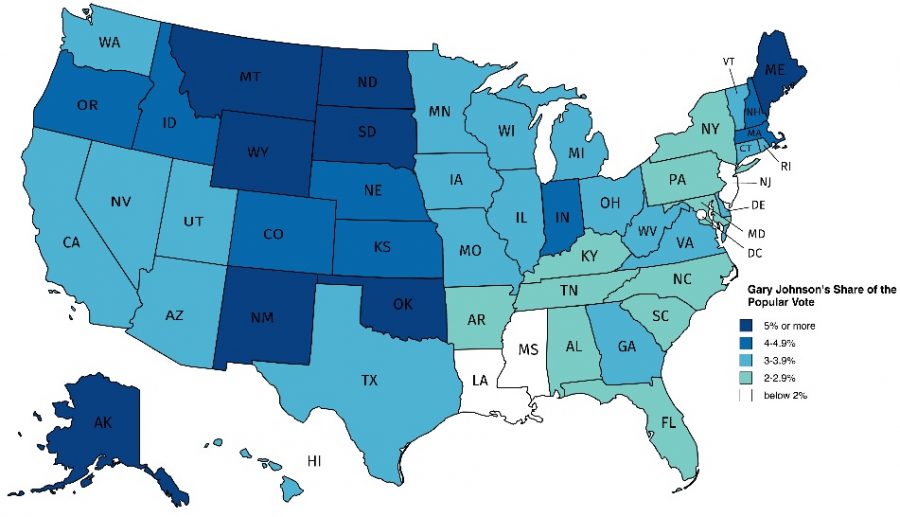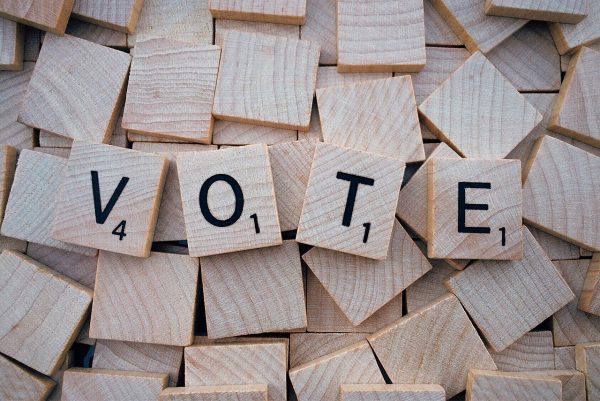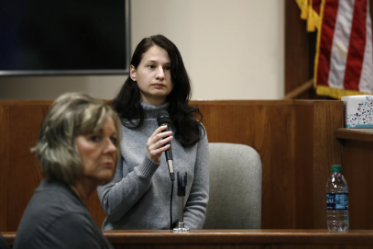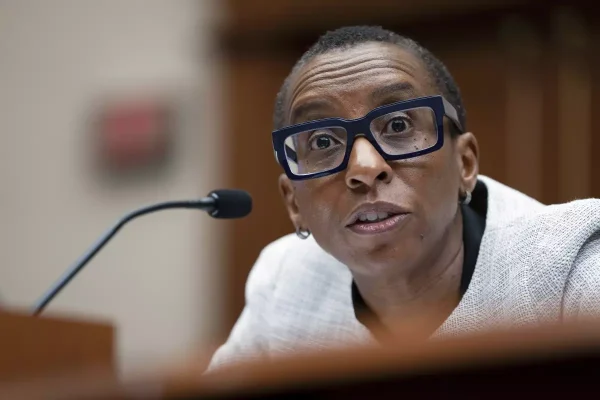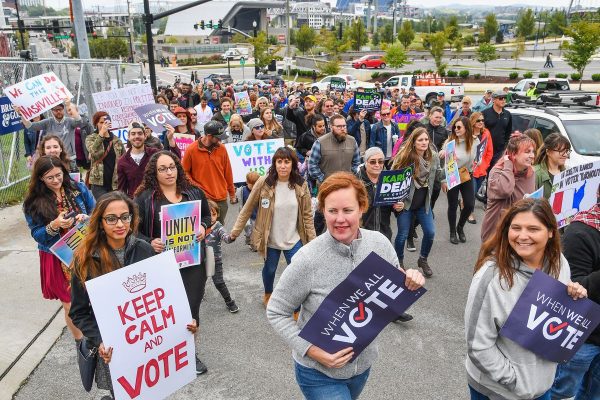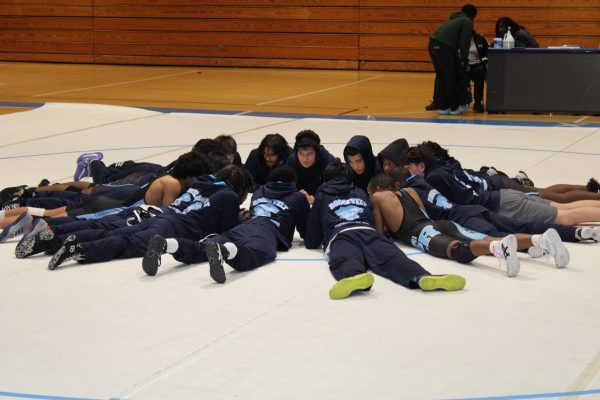Third Party Voters Blamed for Clinton’s Loss
November 13, 2016
This election season, major third party candidates on the ballot included Gary Johnson of the Libertarian Party, Jill Stein of the Green Party, and Darrell Castle of the Constitution Party. On November 8, Donald Trump won the presidency, as well as 47% of the popular vote. Hillary Clinton won 48% of the popular vote, Gary Johnson won 3%, Jill Stein won 1%, and .07% went to other third party candidates. The 5% of the popular vote that did not go to major party candidates is not anything to be surprised by–it is pretty typical of every presidential election–but many Clinton supporters are upset that that 5% did not go to their candidate.
According to the Federal Election Commission, The Green Party has never won an electoral vote in a presidential election, but it has had a presidential nominee on the ballot since 1996. In 2016 it got about 1.2 million popular votes, which is less than half of the 2.8 million it has gotten in past elections.
The Libertarian Party has over 400,000 registered members, four seats in state houses, and has had a presidential nominee since 1972, which was the first and only year it won an electoral vote. However, it has been gaining popular votes since its origin, with the 2016 election being its record year, nearly tripling its votes from 2012.
The other candidates on the ballot for 2016 included Evan McMullin, Darrell Castle, Rocky De La Fuente, and Rocky Giordani. Voters were also given the option to write in candidates. Harambe, a dead gorilla from the Cincinnati Zoo, was rumored a popular write in.
Before the election there was a lot of press emphasizing that a vote for a third party candidate was a vote for Trump. First Lady Michelle Obama made a speech at a Hillary Clinton rally in New Hampshire stating that “if you vote for someone other than Hillary, or if you don’t vote at all, then you are helping to elect her opponent.” A pie chart depicting Bernie Sanders write-in votes as handing Trump the presidency went viral on social media, getting over 61 thousand retweets.
Many Americans that are devastated by the results of this election have blamed third party voters. Looking at the popular vote results, it appears that the 3% Johnson won could have gone to Clinton, and allowed her to defeat Trump. This is an observation that cannot necessarily be proved true.
Historically, third party candidates have always gotten a portion of the votes. There has never been a presidential election in which 100% of the votes went to two candidates.
If third party voters would have voted for Clinton, then she could have gotten more support. According to washingtonpost.com, polls before the election showed that when third party voters were asked to choose between the two candidates, 48% chose Clinton, and 47% chose Trump.
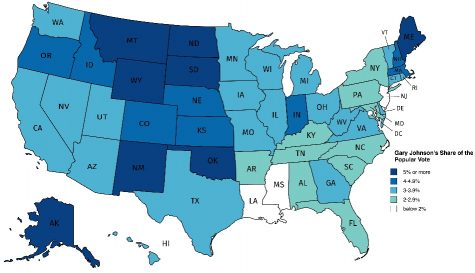
CNN’s election results show the following points: In many critical states such as North Carolina, Trump won over 50% of the vote. Mathematically speaking, if every person in that state who didn’t vote for Trump had voted for Clinton, he still would have won those electoral votes. In some close states, such as Pennsylvania, if it is assumed that every Johnson vote would have gone to Clinton if Johnson was not on the ballot, then Clinton would have pulled ahead of Trump. However, if 1% of the 3.7 million eligible voters that did not show up to polls in that state had voted for Clinton, she also would have won Pennsylvania.
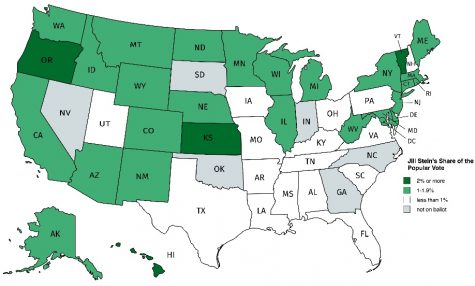
Jill Stein won less than 1% of the popular vote in critical states such as Florida and Pennsylvania. She and Johnson did the best in states that were not close. For example, Johnson won 6% of the vote in Montana, but Trump won 57% in that state, so Clinton still could not have gained those electoral votes. Jill Stein won 2% of the vote in Vermont, where Clinton had won 61%, so Trump would not have benefited.
Other people that have been blamed for Clinton’s loss include FBI Director James Comey, who announced that the agency was looking into more of her emails days before the election, only to announce that charges would not be pressed about a week later, after early voting had already begun.
Ultimately, the lack of Clinton’s votes could be due to sexism surrounding having a woman president, or a number of issues with her campaign. However, it is not the fault of the people who went out and voted for Gary Johnson and Jill Stein, it is the fault of the 59 million voters that voted for Trump, their votes won him the electoral votes and therefore the presidency.
One third party first time voter, DeMatha Catholic High School senior Zach Tschiffely, said he voted third party because he has “seen so much hostility between both candidates and didn’t want to be a part of it.” Similarly, St. Johns University student Kirin Taylor said, “Trump embodied hate, as seen by all of his quotes and general stance on issues,” and that she was “turned off by the hate between the two candidates.” She went on to say that “seeing leaders of our country give such poor examples was disappointing to say the least.” Taylor says she voted for Stein because her stances on issues were more similar to her own. Taylor also said she “researched MD, and saw that it wasn’t a swing state, and by voting third party, I wouldn’t be affecting the results of the election.” Tschiffely is also a Maryland resident, so his vote did not affect the electoral college.
Stephen, a Canadian-American and first time eligible voter in the US said he voted third party because he “found the two-party system can’t reflect the wants/needs of people very well here,” also mentioning that historically in Canada “there have been multiple parties that would participate in debates and be active in multiple levels of government.” He said that even though voting third party may be simply “deferring to other people to decide which of the major two parties to elect, over time. . .there will be more interest in other options.” Taylor said she believes that “the two-party system won’t be broken until there is considerable reunification of the country, better educational standards, and effort from each level of government to foster dialogues between people.” Tschiffely defended the need for a third party. “We can’t just have an established two parties, it’s important to have other parties because there are some people who have different beliefs.”


